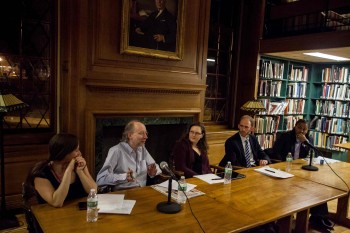Alumni Panel Debates Future of Public Education

Left to right: Moderator Heather Curl '03, Paul Socolar '77, Dolores Reilly '96, Scott Sargrad '04, and Jamal Elliott '96 participate on an education panel. Photo by Brad Larrison
Details
Despite describing a rather bleak forecast for the future of public education, four Haverford College alumni have found ways to offer glimmers of hope through difference-making initiatives.
Panelists examined the landscape of education in the United States–often painting a gloomy picture–and issues of quality, accountability, and equity during a program on“(Un)Chartered Waters: Public, Private, and Charter Schools in America.” The 90-minute discussion, held March 19, took place in the wood-paneled Philips Wing of Magill Library.
“There are kids who are really being lost,” said Jamal Elliott '96, chief operating officer of Wissahickon Charter School and one of the panelists.“There are a lot of people playing politics with kids' lives.”
Other participants were Paul Socolar '77, editor and publisher of The Philadelphia Public School Notebook; Dolores Reilly '96, an English teacher at Cherry Hill West High School in New Jersey, and Scott E. Sargrad '04, deputy assistant secretary for policy and strategic initiatives in the Office of Elementary and Secondary Education at the U.S. Department of Education. Moderator Heather Curl '03 is a lecturer in the Bi-Co Education Program, which sponsored the event along with Haverford College Libraries, the Center for Career and Professional Advising, and the Center for Peace and Global Citizenship.
“For a lot of kids I serve, education is life or death. Kids who look like me,” continued Elliott, who is African American,“if they don't get a quality education, they're either in prison or dead.”
Socolar criticized the lack of sufficient public school funding, pointing out that many Philadelphia District schools lack guidance counselors, librarians, and basic supplies.“It's really appalling and unacceptable, criminal,” he said.
Socolar also denounced the political battles that essentially pit public and charter schoolse–especially over funding–against each other and high-stakes tests that can determine whether a school stays open or not.“Schools are not burger joints,” he said,“[that] if it doesn't work, you close it down.” Schools, he argued, are [crucial] institutions in communities and need to be treated as such.
Despite this backdrop, it was clear that the panelists had found ways to improve the lot of children through education.
Wissahickon Charter is thriving. Its second campus recently opened. Elliott, who grew up in Philadelphia, attended the George School, an independent Quaker school in Bucks County, on scholarship–an experience that proved a stepping stone to Haverford College and other successes. He says he strives to replicate the George School's nurturing atmosphere at his charter school, wher the aim is“to wrap your arms around and love every kid we have.”
In 1994, Socolar founded The Notebook, an independent newspaper that covers the Philadelphia public schools. Ever since, it has garnered kudos for its determination to hold the district accountable. It is, Socolar said,“a voice around equity and the belief in the role public schools play in a democratic society.”
Reilly works in a suburban high school that draws students from diverse socio-economic backgrounds. She said many face a curriculum and assessments that set them up to fail.“We're so rigid,” she said.“We're looking at students as widgets, and do they meet quality standards. … I'm worried. I'm worried we're turning too many people away from education.” Even in the face of those frustrations, she said she loves being in her classroom.“I found my place,” she said.
Sargrad was the most optimistic, despite facing pointed comments from his fellow panelists about federal education policies, such as prescribed curriculums that can limit teacher innovation and high-stakes tests that can eat into classroom time and, by some estimations, narrowly define success.
“The worries over testing are real, and they're real all over the country,” he said. At the same time, Sargrad added, districts need to know how students are doing.“You need good tests to know if kids are making progress year to year.”
In his role, Sargrad said he helps shape policies around standards, assessment, accountability and school transformation. He's convinced current federal policies will ultimately improve education for all children.
For example, he said the Obama administration has encouraged more sophisticated assessment methods rather than reliance on a single, high-pressure exam, and some states are experimenting with that. He also noted that standards are being raised for all students. According to Sargrad, the high school graduation rate is at an all-time high of 81 percent for all students.
“I am hopeful about what's going on in education,” he said.
Curl said the panelists' diverse backgrounds“really informed their perspective and the insight they provided.” Many of the points raised over accountability, the definition of success, and day-to-day classroom realities“are key questions that consistently come up in education discussions, and were articulated well, I thought, in the panel.”
Clio Bodie, a sophomore who attended the event, said the discussion was lively and deep.“I am hoping to be a teacher one day, so it was very empowering to see people who went to Haverford like I do having such success in the education field,” said the psychology major who's minoring in educational studies and hails from Chevy Chase, Md.“I left the panel feeling inspired and motivated to pursue a path in education and to work to help tackle some of the problems that the panelists presented.”
–Lini S. Kadaba



